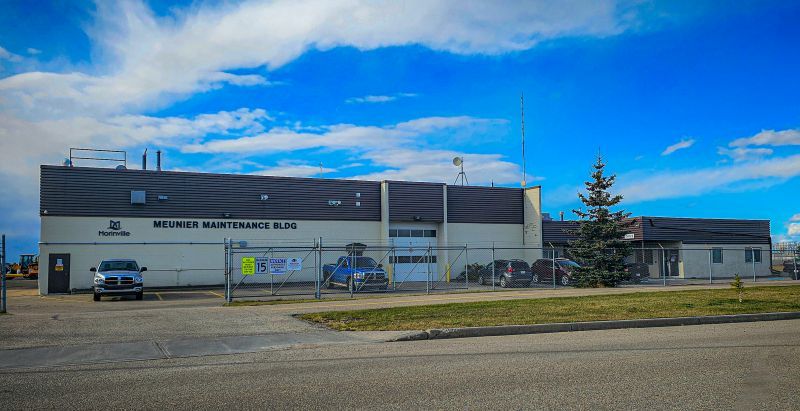By Colin Smith
Town council has chosen to delay the planned 2027 construction start of a major capital project for two years.
The project is replacement of the Infrastructure Services Building, which stands in the department yard at 10310 107 Street.
The replacement is included in Morinville’s long-term capital plan, accepted by council in 2023, with $600,000 budgeted in 2025 for the design phase.
Construction was set to begin in 2027, at a cost initially estimated at $6 million, later revised to $10 million.
Council’s contested decision came at its Tuesday, Oct. 22 meeting as a result of a motion by Councillor Ray White.
White moved that the proposed replacement of the Infrastructure Services Building be transferred to 2029 from 2027.
Following debate, the motion passed in 4-3 vote, with Deputy Mayor Rebecca Balanko and Councillors Stephen Dafoe, Scott Richardson and Ray White in favour, and Mayor Simon Boersma and Councillors Jen Anheliger and Maurice Saint-Denis opposed.
At its Jun. 25 meeting, council directed administration to provide a report outlining the rationale for the replacement of the current Infrastructure Services Building, including options for deferment and savings.
A report delivered on Aug. 27 by Infrastructure Structure Services Manager Jordan Manager stated that the building, constructed in 1979 and expanded slightly in 2009, is no longer suitable due to Occupational Health and Safety concerns, building conditions and a shortage of space and capacity for growth.
A facility condition assessment was done in 2021, and in 2023, an architectural consultant was engaged for the Infrastructure Services Feasibility Study.
According to Betteridge’s report, workplace OHS deficiencies include ventilation issues, inadequate hazardous materials containment and load-bearing wall issues.
The roof is judged to be at the end of its lifecycle and leaks when it rains, and there are issues with the foundations, HVAC, plumbing, and electrical.
Betteridge said the building has already passed capacity, while staffing growth is expected in the future to meet increased service demands.
The architect who conducted the feasibility study looked at two alternatives to building replacement, i.e. doing only the most urgent repairs or expanding/renovating.
The report asserts that these do not suitably resolve the issues or meet long-term needs.
Construction of a new Infrastructure Services Building is to be funded through borrowing, with the debt to be financed over the long term, probably 30 years.
Locking in costs now would provide certainty about the total cost of the project and protect against inflationary pressures, it states.
In the opening debate on his motion, White said he felt the consultant’s report on the Infrastructure Structure Services Building previously presented to council was not very objective.
“The only option that was really presented to us was for a brand-new building,” he said. “There was no thinking outside the box. No thinking about how we can make this building last longer, can we put in more office space that’s wanted.”
White pointed to the debenture financing, which he said would push the ultimate cost of the building to $19.5 million, or $650,000 per year over a 30-year term.
“I’m not saying we don’t need an Infrastructure Services Building,” he said. “I just don’t think this is a good time to be doing this, and two years down the road would provide for more alternatives.”
Councillor Rebecca Balanko spoke in support of the motion, saying that some of the capital to be expended on the project could be spent on other community needs such as repairing crumbling sidewalks, roads and other infrastructure.
Councillor Stephen Dafoe agreed with White that the report of the project was not objective, and that there may be other more affordable options that would meet the needs of the Infrastructure Services department.
The report of the OHS deficiencies in the Infrastructure Services Building gives Councillor Maurice Saint-Denis “A lot of trepidation.”
“We have a building that is neither safe nor dependable for our staff and the idea of delaying that for two more years to then revisit it doesn’t sit well with me,” he said.
“To delay the decision for two more years is precisely what got us into this infrastructure deficit today and only results in greater costs for taxpayers.”
The problems with the existing building, including provisions for staff, and liability issues was also a focus for Councillor Jen Anheliger.
“We know deficiencies exist and we know we are going to have to take action,” she said. “If we are not going forward with this project, I would like to see a plan.”
Apart from the need for the new building itself and its timing, council was divided on what approach should be taken to making the decision.
White argued that with an election coming up next year the issue should be left to the next council to decide.
“I think this should be in front to the electorate for us to run on, to make the argument for or to make the argument against,” he said. “I think the electoral process will do that.”
His position was supported by Councillor Scott Richardson.
“I think by opposing this it gives a chance for the new council to have an idea of what they want to do and go from there,” Richardson said.
This line of thinking was opposed by Mayor Simon Boersma.
“Critical infrastructure projects should not be dictated by the electoral cycle,” he said. “If we were to delay this project, it could set a precedent for other critical projects to be deferred.”
Said Saint-Denis, “I respectfully disagree that this project should be decided in our next election when we were elected to make these decisions.”
Morinville Council delays $10M Infrastructure Building Project by two years after divisive vote


More Stories
MCHS Students Showcase Skill and Determination at Skills Alberta Provincial Competition
Morinville student creates powerful poster for Red Dress Day
Deanna Stang Appointed as Deputy Mayor